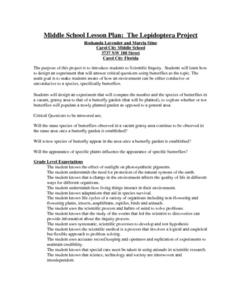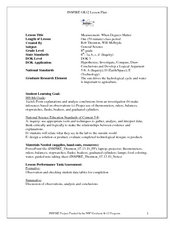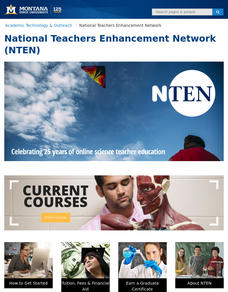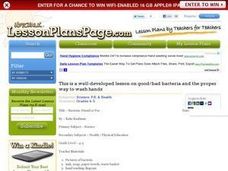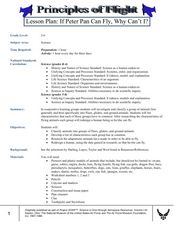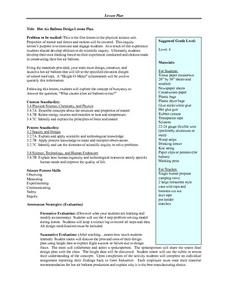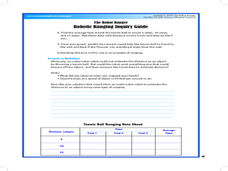Curated OER
The Weather Classroom: Atmosphere
Students explore the planets and their atmospheres online. They write the story of "Goldilocks and the Nine Planets" to explain how each planet's atmosphere differs from Earth's. They design a viable life form.
Curated OER
The Wildland/Urban Interface Dilemma
Students examine all sides of the issues surrounding wildland fire. Groups assume the roles of different people who must decide what to do about a fictitious wildfire. They have a discussion to analyze the issue. A good, real life...
Curated OER
What Repair Proteins are Expressed in C-Ferns After Exposure to Varying Amounts of UV Radiation?
Students examine the life cycle of c-ferns. They complete experiments on the organisms exposing them to differnet amount of UV radiation. They collect data and analyze their results.
Curated OER
Pulsar Stars And Black Holes
Pupils explore the discovery of pulsar stars, and the characteristics of pulsar stars. Theories and ideas behind black holes are discussed. The issues of women's historical role in science are also touched on.
Curated OER
The Lepidoptera Project
Students are introduced to Scientific Inquiry and discover how to design an experiment that answers critical questions using butterflies as the topic. They design experiments that compare the number of species of butterflies in a vacant,...
Curated OER
Teaching Biology Through Problem-based Activities
Students plant seeds and observe the life cycle of the organism. They experimentally research the effects of radiation on seed growth. Students determine the effects of environmental pollutants on harvested seed.
Curated OER
Measurement: When Degrees Matter
Eighth graders record the temperature change of the beakers. In this general science lesson, 8th graders create their own data table for recording observations. They discuss experimental results and cite real life applications.
Curated OER
Environment: Understanding Change
Young scholars predict changes that will occur in the environemt after trees are cut down around a house. They focus on changes in the hydrosphere, geosphere, biosphere, and atmosphere. By examining the rings in a tree's trunk, they...
Curated OER
Ecology: Adaptations
Eighth graders identify different types of adaptation in organisms. In this biology lesson, 8th graders explain how adaptation help organisms survive. They complete a worksheet at the end of the lesson.
Curated OER
Human Evolution
Young scholars make and use observations of Laetoli footprints to provide clues to life in the past. They collect and analyze data to study the relationship between foot length and body height.
Curated OER
Wh0-o-o-o's Out There?
Fifth graders describe the physical features of an owl and identify survival adaptations. They Investigate an owl's niche in an ecosystem. The students participate in an interactive puzzle on the internet that helps for motivation.
Curated OER
Light at the Bottom of the Deep, Dark Ocean?
High schoolers participate in an inquiry activity. They relate the structure of an appendage to its function. They describe how a deepwater organism to its environment without bright light.
Curated OER
Hatching Brine shrimp
Second graders investigate the life cycle using brine shrimp as an example. They conduct observations by watching the shrimp hatch out of cysts. Students design simple experiment to structure an observation. The experiment is approved...
Curated OER
Aerology- The Study of Mars
Students investigate various aspects of the planet Mars. They examine a core sample that is simulated to make observations. Then compare the known sample with one that is unknown and differentiate between the two. Students hypothesize...
Curated OER
Do Human Practices Affect Water Quality?
Students determine if human practices have any noticeable effects on the quality of stream life as measured by the presence of certain macroinvertebrates. They collect, preserve and identify macroinvertibrate samples and quantify the data.
Curated OER
An Introduction to Brine Shrimp
Second graders engage in a lesson that seeks to discover information about Brine Shrimp. They conduct research using a variety of print and electronic resources. Students study the type of environment the shrimp need and read about the...
Curated OER
Rainforest Deforestation and the Water Cycle
Students create terrariums (mini rainforests). They observe and discuss the life processes that occur in their terrariums and how changes in these processes affect the plants and organisms inside. They collect and graph data and present...
Curated OER
Lord of the Rings - A Study of Tree Rings
Students examine trees and discuss how the environment effected the tree. They also predict what the area look like in fifty years.
Curated OER
Bacteria: Friend or Foe?
Young scholars examine a variety of environmental and industrial roles of bacteria. explore where bacteria can be found and distinguish bacteria from other organisms.
Curated OER
If Peter Pan Can Fly, Why Can't I?
Students redesign a human, using data in research, so that s/he can fly. In this flying lesson, students examine the characteristics and adaptations of groups of animals that can fly. Using this research, students work cooperatively to...
Curated OER
Hot Air Balloon Design Lesson Plan
Sixth graders discuss what they know and what they want to know about hot air balloon using a KWL chart. They then use a wide array of materials to design a hot air balloon that will lift successfully in cooperative groups referring to...
Curated OER
The Frog and the Ol' Black Fly
Students explore frogs. In this cross curriculum literacy and frogs lesson, students predict the plot and then listen to the book The Wide-Mouthed Frog by Keith Faulkner. Students define "predator" and identify foods a frog might eat. ...
Curated OER
The Robot Ranger
Students participate in an experiment to understand how robotic systems can estimate distances. In this robotic ranger lesson, students measure the the time it takes for and object to move back and forth. Students will use a tennis...
Curated OER
Whale Watcher Game Lesson
Students participate in an online whale watching game. They identify the reasons for migration and describe the route. They make predictions on what would happen if the ways did not migrate.
Other popular searches
- Life Science Inquiry Fossils
- Life Science Inquiry Frogs
- Life Science Inquiry Lessons
- Life Science Inquiry Labs
- Life Science Inquiry Mammals
- Life Science Inquiry Chicken
- Inquiry Based Life Science






